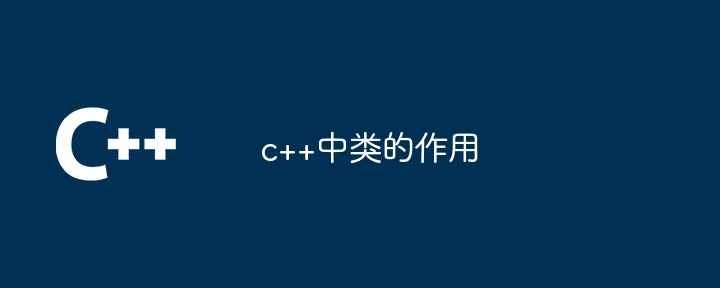Home >Backend Development >C++ >The role of classes in c++
The role of classes in c++
- 下次还敢Original
- 2024-05-06 16:57:17832browse
The role of classes in C: Data abstraction: encapsulates data and operations, hiding implementation details. Data Hiding: Control access to member variables and functions through access modifiers. Code reuse: Reuse as a template to reduce the writing of duplicate code. Object-oriented programming: Provides concepts such as objects, classes, inheritance, and polymorphism to model the real world more naturally. Extensibility: Easily extensible to create new subclasses or implement new functionality through inheritance and polymorphism. Code Organization: Helps organize and modularize code to make it easier to understand and maintain. Exception handling: You can define your own exceptions to catch and handle specific errors or exception conditions.

The role of classes in C
Classes are the core concept in C language and are a user-defined A data type that can be used to represent custom data structures and behaviors. It encapsulates data and functions that operate on that data, providing many benefits such as data hiding and code reuse.
Function
1. Data abstraction: The
- class encapsulates data and behavior in a unit. Implementation details are hidden.
- Thus making the code easier to understand, maintain and extend.
2. Data hiding:
- Classes control access to member variables and functions through access modifiers.
- Allows data to be encapsulated to prevent accidental modification.
3. Code reuse:
- Classes can be reused as templates to create new data structures and behaviors.
- Reduce the writing of duplicate codes and improve code efficiency.
4. Object-oriented programming (OOP):
- Classes are the cornerstone of OOP, providing objects, classes, inheritance, polymorphism, etc. concept.
- Allows more natural modeling of the real world.
5. Improve scalability:
- Classes are easy to extend and can create new subclasses or implement new ones through inheritance and polymorphism. Function.
- Improve the scalability and maintainability of the code.
6. Code Organization:
- Classes help organize and modularize code, making it easier to read and understand.
- Different classes can represent different functions or entities.
7. Exception handling:
- Classes can define their own exceptions to catch and handle specific errors or exceptions.
- Improve the robustness and reliability of the program.
The above is the detailed content of The role of classes in c++. For more information, please follow other related articles on the PHP Chinese website!
Related articles
See more- What are the steps generally required to write a C++ program?
- Can Microsoft Visual C++ be uninstalled?
- Redis: a powerful tool for building highly scalable systems
- Advanced Practice of C++ Network Programming: Building Highly Scalable Distributed Systems
- How can Java functions help enterprises build highly scalable applications?

